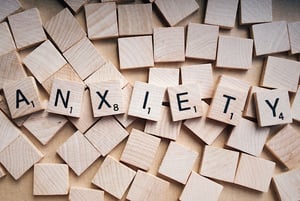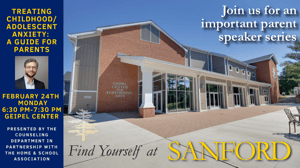 According to an article from the American Psychological Association (APA), nearly one-third of children have been diagnosed with anxiety and it is the most common mental health disorder in kids. Below are four facts that you should know as you explore the causes and effects of childhood anxiety.
According to an article from the American Psychological Association (APA), nearly one-third of children have been diagnosed with anxiety and it is the most common mental health disorder in kids. Below are four facts that you should know as you explore the causes and effects of childhood anxiety.
1. Anxiety is more than feeling nervous.
Everyone has moments when they feel anxious. Some people feel stressed before taking a test, and others get weak in the knees during group presentations. Feelings like this are completely normal. In fact, a healthy stress response can help you avoid potential dangers and succeed in life. However, clinically diagnosable anxiety is the natural stress response going into overdrive and alerting you to danger when there isn’t actually a problem.
Nemours Health Foundation explains that there are many different kinds of anxiety disorders that affect kids. For example, Generalized Anxiety Disorder causes kids to worry frequently and intensely about many different topics, while phobias are acute and long-lasting fears about specific things. Regardless of what type of anxiety affects your child, you may notice that anxiety is often rooted in a theme (ex: a need for perfection) and can be debilitating to the person experiencing it.
2. Anxiety can look different at various ages.
While every child’s experience is different, there are some common ways that anxiety manifests itself at different ages. Young children may have difficulty concentrating on tasks, or, conversely, they may be so intensely focused on something that they find it hard to relax and have fun. Elementary school-aged children may have trouble falling or staying asleep, and they might complain of feeling sick, especially with stomach aches or headaches. You could also notice your child over-reacting and having strong emotional responses to situations that trigger their anxiety.
Children in middle and high school might exhibit feelings of restlessness and being “on edge,” or they might even experience panic attacks. Older children may be irritable, or have changes in behavior, like withdrawing from others or having a lack of interest in activities they once enjoyed. Similar to younger children, kids in middle and high school may have difficulty focusing, sleeping, or they could express psychosomatic complaints like headaches, stomach aches, muscle pains, or a racing heart.
3. Anxiety can have big effects on learning.
Students struggling with anxiety may perform poorly on tasks related to working memory or have difficulty shifting attention from one topic to another. Kids may get fatigued quickly when they’re working, or they may try to completely avoid tasks that are challenging for them. Children may have a hard time controlling their emotions when something happens that they don’t like, and those emotions can be intensified if they begin to have a panic attack that prevents them from focusing clearly. It’s important to note that anxiety can sometimes look like inattention, so if your child is having a hard time paying attention in school you may want to explore whether feelings of anxiety could be the root cause.
4. There are many ways to support Children with anxiety.
Anxiety can be caused by many things, such as increased academic demands, peer relationships, bullying, pressures around the college process, or the competing desires of both wanting and fearing increased independence. The best way to support your child will depend on both the causes of your child’s anxiety as well as the way that it manifests itself. If your child is struggling with anxiety, professional clinical support is highly recommended, but there are also techniques and materials that you can use at home. For example, you can experiment with the six strategies described in this Psycom article, such as setting clear expectations and goals or teaching your children how to reframe their thinking so that they aren’t overwhelmed by anxious thoughts. You may also want to download our list of suggested anxiety support resources, which includes book and website recommendations for both kids and parents.
 Anxiety can be a challenge for children and their parents, but with knowledge about the disorder and ideas for resources, you will be able to help your child successfully navigate their journey with anxiety! To learn more, join us for the Treating Childhood/Adolescent Anxiety: A Guide for Parents presented by Professor Eli Lebowitz, director of the Program for Anxiety Disorders at the Yale Child Study Center, at Sanford School on Monday, February 24th from 6:30 PM-7:30 PM. This is a free event open to the community.
Anxiety can be a challenge for children and their parents, but with knowledge about the disorder and ideas for resources, you will be able to help your child successfully navigate their journey with anxiety! To learn more, join us for the Treating Childhood/Adolescent Anxiety: A Guide for Parents presented by Professor Eli Lebowitz, director of the Program for Anxiety Disorders at the Yale Child Study Center, at Sanford School on Monday, February 24th from 6:30 PM-7:30 PM. This is a free event open to the community.
Sanford knows the importance of having a strong counseling program in school matters. We have a full-time counselor for each division. To learn more about our counseling program, go to Sanford School's School Counseling page.
Courtney Gregor is the Middle School counselor & learning services coordinator. She received her bachelor's degree in Psychology from Franklin and Marshall College and a master's degree in School and Mental Health Counseling from the University of Pennsylvania. She also has a National Counselors Certification. In addition to serving students as a counselor, Courtney is the head swim coach at Sanford.
Skye Rashkind is the Lower School counselor & learning services coordinator. Skye has been an educator for 25 years in a variety of roles and school communities. She has taught at the elementary school level, has been a museum educator, an admissions counselor, and a tutor. Skye holds a B.A. in Psychology from Dickinson College, an M.A.T. in Elementary Education from Brown University, and an M.Ed. in School Counseling from Wilmington University.
Sarah Satinsky is the Upper School counselor & learning services coordinator. Sarah is a Licensed Professional Counselor of Mental Health (LPCMH) in Delaware and was in private practice in Texas before moving into the school counseling world. She earned her bachelor's degree from The University of Texas at Austin and received her master's degree from Southern Methodist University.









